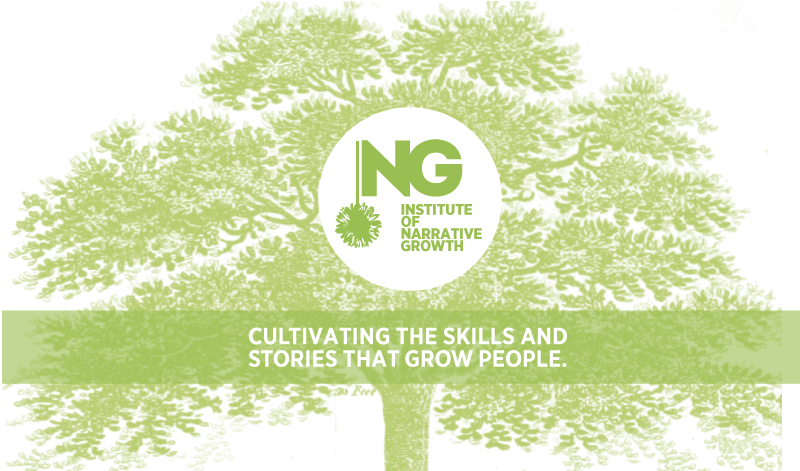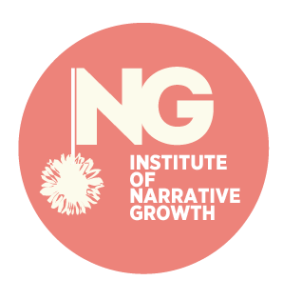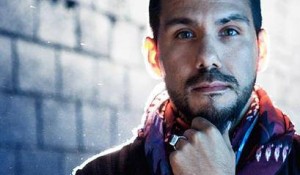COMMUNITY :: THE INSTITUTE OF NARRATIVE GROWTH : CAITS MEISSNER and MARK GONZALES

There is nothing more at the heart of The Operating System than a deep belief in the transformative power of creative practice — of storytelling and narrative practice, in particular. In light of that, nothing could give me more pleasure than to join friend and frequent contributor (aka worldchanger) Caits Meissner and her co-founder, visionary social entrepreneur Mark Gonzales for the launch of their new project, The Institute of Narrative Growth, at Wix Lounge March 3rd.
In this interview, Caits joins Editor Lynne DeSilva-Johnson for a candid conversation about the genesis of this important new endeavor – including thoughts on shifting educational models and (that often avoided topic) funding, which will speak to so many of you with similar ideas brewing. Enjoy, and take note! There’s so much to learn from here.
[box] [h6]If you are in New York, COME BE INSPIRED! this promises be a groundbreaking and exceptional evening,from passionate, visionary folk — replete with complimentary, local, tasty (vegan, gluten free!) treats from Brooklyn Fork & Spoon.
You must reserve your ticket at www.amiando.com/narrativegrowthny – and please, don’t let the ticket price stop you! The few dollars for you support this initiative directly – not a cent goes in a private pocket. (More below). You get free snacks, inspiration, and a workshop! A great deal. [/h6][/box]
LDJ: THANK YOU, Caits, for joining us today! You know our drill – give us the Insitute of Narrative Growth elevator pitch, a short sweet intro for our readers. What’s your pithiest mission statement?
CM: The Institute of Narrative Growth is a new platform for advancing story-based approaches to healing and success – our tagline: cultivating the skills and stories that grow people. Our mission reads, Imagining a world that begins where trauma ends, the Institute of Narrative Growth offers distance and direct learning models that teach interdisciplinary, narrative-based approaches to personal success, healing trauma and social wellness. Our vision is to make treatment, recovery and growth accessible to communities globally by engaging the most common form of idea exchange: story.
We’re transparently still in the visioning stages, understanding this will be an evolving and growing effort, and subscribe to the entrepreneurial model of jump and grow wings! We’re excited to begin with online courses (we like to call them journeys) that embody the concepts we’re incubating as a beginning step to much larger goals. And let me be clear in the need to honor our ethics of nurturing stories verses directing, dictating or replacing them: when I speak in this interview, I am speaking as Caits, as I’d never want to speak for Mark [Gonzales], my Co-Founder.
LDJ: An important clarification, and thank you for the great, short(!) introduction. It’s truly hard to do with a project that’s so many years in the making, as many of us know well.
Speaking of “many years in the making,” talk to me about your transition into this project: what led you both here, and why is this particular project so important to you and Mark? Also, what if anything made you both feel like this was the right/only/necessary time? In addition to personal/interpersonal reasons, was there any specific impetus from contemporary culture or an outside influence that inspired the actualization of this long time idea into reality?
CM: Mark Gonzales (a long time friend and impressive visionary) and I have been working in parallel educational, sacred spaces and artistic spaces, and were sparked by the idea of formalizing the field of storytelling and it’s ability to shift individuals and communities from a repair-based paradigm to a growth-based paradigm. We’ve seen the potential of storytelling to heal across sociological and physiological spectrums and felt an undeniable call to widen the community, open the borders and bring voices together.
[superquote] regardless of institutional frameworks, human spirit perseveres.[/superquote]
We’ve both witnessed the hunger and desire for an effort that mobilizes people around work being done formally and informally in backyards, on folding tables, in community centers and classrooms. It felt, on a gut level, like the right time to vision a global platform that could immediately connect voices, and begin to create a reality where writing and sharing our complex, nuanced stories become pathways to holistic wellness. Many people are already engaged powerfully in this work – and we hope they can find a home and join us under the phrase of Narrative Growth.
LDJ: Can you say a little about your relationship to education and teaching – both in traditional institutional and extra-institutional environments? Give us a little feeling of your opinion of how those models are succeeding and/or failing – where have you had the most successful/meaningful experiences, on either side of the blackboard?
CM: I’ve taught in formal and informal learning spaces for 15 years, since I was a young person myself. Traditional classrooms, especially in public schools, are often operating on what I consider to be a failing educational model – even the most innovative schools are constructed within the confines of outdated systems that involve accessing only one side of a human’s overall contribution (IQ over EQ, etc.) I find standardized testing limiting and overwhelmingly anti-spirit. I am not sure advanced degrees are always working at a much higher vibration, and often the emphasis is on personal achievement and ambition, ignoring the socio-emotional implications of devaluing or ignoring the importance of being a contributing member of a larger ecosystem. It is a departure from what I feel is our innate humanity, which craves profound and intricate human connection, and non-hierarchically values a variety of roles within society.
With that said, however,regardless of institutional frameworks, human spirit perseveres. I believe transformative learning can happen nearly everywhere. In a recent teaching artist assistant training, I tasked participants with mapping their most life changing educational experiences. My favorite part of that dialogue was charging them with thinking beyond the classroom to the street corner, their Grandma’s kitchen, under their headphones. The answers were moving. I have had equal spark and joy within a windowless classroom, in a jail cafeteria and in a museum. The environment is important, but it is not what ultimately makes the experience – the people do. This is the energy we are seeking to tap into.
LDJ: As someone who’s taught for so many years in and out of traditional institutional frameworks, I hear you loud and clear – both about the anti-spirit outdated systems and the perseverance of the HUMAN spirit, despite all of that.
Let’s talk for a second about emergent educational systems and models. For instance, do you consider this a peer-to-peer learning environment? What influence have other emerging educational initiatives and/or programs had on your planning of this project, theoretically or practically? Can you identify other people or programs, either locally or on a larger scale, who are in your opinion pioneering the type of learning you are hoping to initiate here?
CM: Right now, our learning experiences exist online, rolling out with a course I have already been in process with, Digging Deep, Facing Self, for three previous sessions. Peer-to-peer may be a stretch as a defining label, but we certainly aim to provide a more horizontal experience. The facilitator is still a guide, holding the vision for participants, but is not seen as guru. We believe in the importance of mentors, but also uplift the knowledge that the community offers undeniable wisdom and gifts in their interactions – to not only each other, but to the creator of the experience. Anyone can become a teacher at any moment. Sustainability and trainings are also an important part of our vision. [Editor’s tip: download this gorgeous, free eBook anthology from a previous Digging Deep, Facing Self session]
As we grow into our next stages, and hopefully far beyond our own names, we envision a series of summits that bring together other voices in the Narrative Growth field who use storytelling in exciting support of personal and community growth. We are identifying a variety of incredible practitioners to deliver innovative workshop experiences in models both pay-for-participation and free, curriculum guides, and offer consulting services for communities looking to bring story into their organizational fold. There are so many exciting ways to partner with others, and let the dialogue expand the vision. But first, baby steps!
We are inspired by the Narrative Medicine field, which looks at storytelling and healing from a medical lens, as well as art therapy – all informing models. Our approach springs from a capacity-based perspective and we are interested in the way storytelling has long existed as a tool for healing, growth and change across a variety of ancient and indigenous communities. Old story, new script. Or old tale, new technology. We are formalizing a tool and a truth, naming a space for our processes and people to convene and share.
[superquote] How special to parallel the stories of a woman in Tanzania with a woman in Georgia. Think about the kind of conversations that open up when a 40 year old white stay-at-home mom connects with a 25 year old lesbian Latina from the Bronx. These two may never enter a room together in person, by sheer virtue of geography and/or identity, and here they can exchange inner thoughts, see intimately inside the other’s experience. [/superquote]
LDJ: Speaking of non-local platforms, talk to me about how your intentions meld with/are supported by current trends in social-media and technology driven/enabled learning (MOOC’s, etc). What are your intentions, especially given your cross-country collaborative team, in using virtual platforms in lieu of / in tandem with face-to-face environments?
CM: While there is a lot of grumbling – and often by me! – about the online sphere causing fracturing and disconnection, there is another special aspect of these tools – a new possibility for intentional connection. Bottom line, whether we like it or not, our Grandmothers are texting, and our youth often spend more time on technology than playing jumprope. With a space that already has our attention, I’ve found in leveraging the internet and social media for healing work, there is an unexpectedly special dynamic that occurs.
The women in my course hail from around the world. Some may never have access to the kind of guidance/conversation provided in our courses, simply because it doesn’t exist yet in their communities, or is inaccessible. Alternatively, participants might never open up, too shy to become vulnerable while looking a friend eye to eye. The online space gives a certain level of comfort in the relative anonymity – the strangers are all in the journey together, but we don’t know much about each other’s background – and yet, a deep connection occurs, a sacred sharing. How special to parallel the stories of a woman in Tanzania with a woman in Georgia. Think about the kind of conversations that open up when a 40 year old white stay-at-home mom connects with a 25 year old lesbian Latina from the Bronx. These two may never enter a room together in person, by sheer virtue of geography and/or identity, and here they can exchange inner thoughts, see intimately inside the other’s experience.
Quite honestly, I am still discovering the language to describe how powerful this has been to witness. Mark and I recognize that power on many levels: the power to empathize/enter another person’s experience through story (always, when invited, of course), the power to bridge cultural divides, the power to give access, the power to open space, the power to confront hidden memories and desires, the power to share one’s voice, the power to control one’s own narrative.
LDJ: You’re clearly engaging in working WITH new media, creating both offline and virtual publications from these workshops – like the free eBook seen above (made using issuu) from an earlier DDFS course. This is a beautiful, wonderful, non-cost-intensive take away for students and public alike, and I applaud it. But where does the cost/free divide enter the conversation?
Perhaps originating in the freesharing/public ownership roots of the Open Source movement, something that’s becoming common in peer-to-peer learning environments as well as MOOC’s that are linked to large educational institutions (MIT, Iowa, Stanford, etc) is that much of the resources available are free or charge very little. This is true offline as well (the public school, etc). There of course are paid, similar models both virtual and in person (Skillshare, Brooklyn Brainery, Chicago Institute of Poetics, The Poetry Project, many online courses through both institutions and NGO’s, etc).
Can you talk a little bit about your relationship (and perhaps struggle) with money as a creative person and social entrepreneur? We all know that access to funds allows beautiful projects to prosper, and also that many very socially successful businesses and organizations – from the small and local (for example, Mellow Pages) to the small and institutional (i.e.: The New York Public Library… or, sadly, libraries everywhere) to giant ones (like the Wikimedia Foundation) at times struggle to keep themselves afloat, often because of a learned relationship to how and where we spend (or save) our money.
I personally have worked hard to evolve my own relationship with abundance via currency in the past few years, and I now I am able to see a space in which both charging for your work as well as paying for things that you care about deeply as a great step in our cultural and creative adaptation to a sustainable practice.
CM: Open source and other models of accessible learning are wildly attractive to me as a change maker and creative. I love the concept of leveling the playing field, and opening doors across socio-economic lines, of giving from the heart and striving to eradicate the harmful ills of capitalism! That is the idealist living in my heart that throws an exclamation point on the sentence. However, it is important to see who is leading these movements, and how they are surviving.
– Passion project?
– A gift from a large institution with large institutional funding?
Who is at the root of these projects, and what has allowed them to exist?
I bring these questions to surface because I am currently working my way out of a long held belief system that money is inherently evil, and those who have are inherently bad people. Struggle and selfless service seemed to me the ultimate models of sacrifice for the greater good, a marker of authenticity. Many I know have also internalized this dialogue, and in turn are unable to access healers when ill, pay rent, take time off of work to enjoy life – a key principle of ours at ING – the right and capacity to live over survive, thrive versus exist. This mind set has been profoundly harmful to not only myself, but people and communities I love and cherish. I decided it was time to change.
In my own world I began to look at ways I could value the work I create and deliver. I examined what an empowered model of existence looks like, and what practices would allow me to be the best facilitator, wife, friend, daughter and woman I could be. I do plenty of free engagements and often offer my services in service of others, and find gratifying currency in notes of gratitude, witnessing growth and meaningful exchange, but I also believe in two concepts:
[box][h6] 1. When people invest financially in themselves, if they are able to, it can be an unparalleled powerful act of commitment and claiming.
2. I am my best self, and therefore in the best shape to guide or commune with others, when I am not riddled with anxiety about where my next meal is coming from, or over stretching into illness. [/h6][/box]
This act of self care I hope will become a model for others to value their own work and contributions. And of course, there is a process of learning and giving before you move into a paid model. I had to be sure to my processes had proven transformative, that I had the experience to responsibly value my own power. Additionally, it is always in my ethics and methodology to offer a number of need based scholarships each round of delivery, to balance giving and receiving. Bottom line, I want all of the world’s children to eat well, including my own.
What of your services are you planning to charge for and/or what is your intended financial model? Will you crowdfund or use traditional channels of nonprofit funding (grants, etc)? Do you feel that it is important to be transparent in our own relationships to financial sustainability as we give tools to/teach creative people (and people learning to use creative practice in a process of self-growth)?
ING is still solidifying our models of funding and how we’ll pursue growth, but we’re keenly aware of transparency. In fact, a guiding principle we’ve identified internally for our work reads, in rough format:
[superquote]“We acknowledge that capital extends beyond printed papers and rare metals, yet does not exclude these forms. Regardless of the medium it comes in, when engaging with funding, we believe in intentional relationships via sources that have ethical & transparent roots.” [/superquote]
In loose terms, we are looking at our work in more of startup framework than a non-profit. Having become disenchanted with non-profit models we’ve seen compromise ethics out of financial necessity, or rely on a specific grant that dictates and reshapes programming, we are keen to not fall victim to the tailoring of vision to remain afloat. Instead, what we are aiming to achieve is a number of financial models that provide access to and engine capital on varying levels – individual paid courses ala Universities, gifted workshops via sponsored scholarships, free curriculum and other ways of touching people across the financial spectrum. It is a tough line to walk, but we intend to do it as gracefully, ethically and honestly as possible.
And if you want to be very specific: your event on the 3rd has an entry fee – why? How do we get people to care about, commit to and attend events that have cost attached when so many are free? What does paying an entry fee contribute to in this case?
A great question – and one I have openly wrestled with considering our conditioned desire for free, free, free! If you can imagine, an entry fee covers the food supplies for the meal provided by the generous catering company Brooklyn Fork and Spoon (vegan, veggie & gluten free!)- and hopefully, if we’re lucky, some overhead such as travel expenses, website fees, typical start up costs needed to launch a successful platform. We’re incredibly blessed to have been gifted the coveted and gorgeous Wix Lounge venue by engaging Wix as a sponsor.
Additionally, it is important to us that our work be valued. How can we ask others to heal, be successful and value their own contributions if we don’t value ourselves? Granted, Mark and I won’t walk away with any money from our launch event to personally feed our individual bank accounts, but we’ll end the night feeling confident that our vision and work, by virtue of being honored with a financial contribution, is at it’s top performance. We can take care of our community by providing a fully worthy and moving experience.
[line]
[column_one_third]

Institute of Narrative Growth
www.narrativegrowth.com
facebook
twitter
[/column_one_third]
[column_one_third]

Mark Gonzales
www.wagebeauty.com
facebook
twitter
[/column_one_third]
[column_one_third]

Caits Meissner
www.caitsmeissner.com
facebook
twitter
[/column_one_third]
[line]
Caits Meissner is an award-winning poet, educator and vibrant creative force dedicated to transformation and healing through storytelling. For over ten years, Caits has extensively facilitated youth and adults in poetry and multi-media expression and healing, and has worked long-term instituting innovative arts education programming at cultural institutions such as Tribeca Film Institute, Urban Arts Partnership, The Facing History School and the Lower Eastside Girls Club. Caits’ poetry of witness has been awarded first place prizes from the Pan-African Literary Forum and the Ja’Nai Foundation and she serves as Co-Founder of The Wide Shore global women’s poetry magazine. In 2014 Caits co-founded the Institute of Narrative Growth, a platform for advancing story-based approaches to healing & success. She has read for The Operating System/Exit Strata at The NYC Poetry Festival and Launchpad Brooklyn, and has contributed online via her Transcribing the Journey Field Notes series as well as to our 2012 and 2013 Poetry Month series.
[line]
Mark Gonzales is a… Writer. Speaker. Entrepreneur. Philosopher. Thinker. Mark Gonzales has many titles, all of which reveal an appreciation for life & a passion for creativity. With over a decade of experience focusing on emotional intelligence, sacred education, design thinking, & human development, he is the premier voice in the role of culture in re-shaping genetic memory. His portfolio of clientele have spanned fourteen countries & include: Stanford University, TED(x) talks, Nobel Peace Prize Laureates, Refugee centers in the Middle East, and the World Islamic Economic Forum. In 2014, he co-founded the Institute for Narrative Growth, a platform for advancing story-based approaches to healing & success.
A prelude to his work can be found best via twitter:@WageBeauty
[line]


